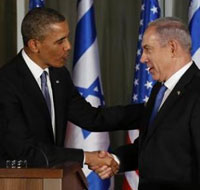21 Mar 2013 - {{hitsCtrl.values.hits}}
 After an effusive welcome in Israel, President Barack Obama traveled to the occupied West Bank on Thursday for talks with Palestinian leaders who accuse him of sidelining their dream of statehood.
After an effusive welcome in Israel, President Barack Obama traveled to the occupied West Bank on Thursday for talks with Palestinian leaders who accuse him of sidelining their dream of statehood.
27 Dec 2024 26 minute ago
27 Dec 2024 1 hours ago
27 Dec 2024 2 hours ago
27 Dec 2024 2 hours ago
27 Dec 2024 3 hours ago